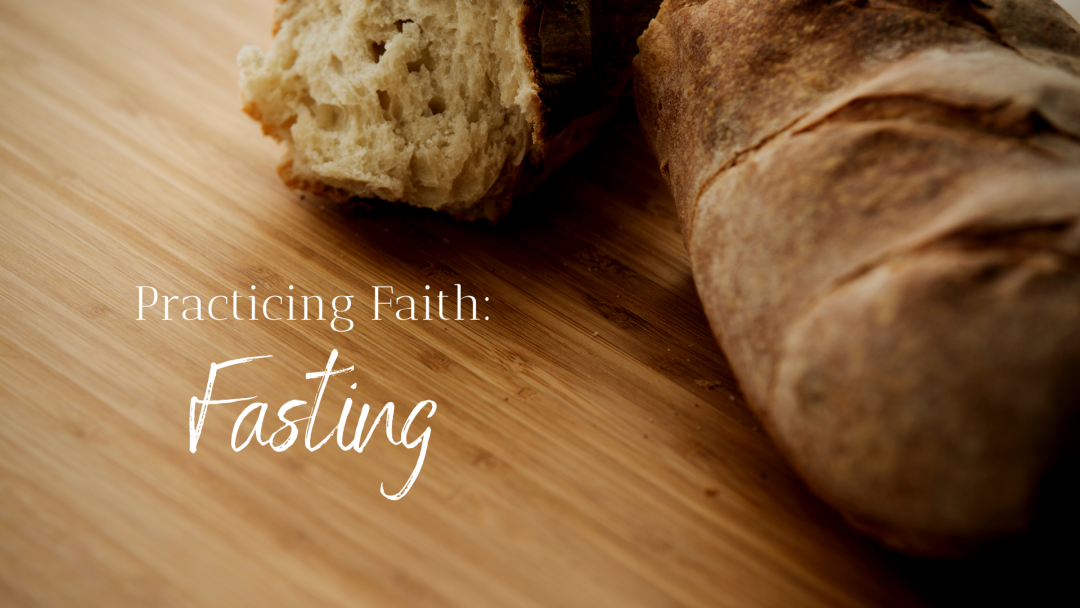
In the long weeks of working from home, taking advantage of the time we spend together, and slowing down, my husband and I have come to recognize the importance of being disciplined. It's no surprise that one of the fruits of the Spirit is self-control. Its importance has become abundantly clear to us, especially with the refrigerator just a few steps away from our workspace. Now more than ever, it's become pivotal for us to keep track of the calories we've consumed. Along with the self-control we need to exercise over the food we eat, we have more and more felt a deep desire for structure and discipline in our spiritual lives as well. As spiritual beings, we desperately need to draw close to our Maker through the practices that edify our faith, bring us into communion with God, and allow us to engage with the goodness of who he is.
One of the ways that we draw near to God is through the practice of fasting. When we hear the word "fasting," our stomachs may drop a little. As I wrote in the previous paragraph, abstaining from food doesn't come easily for many of us, myself included. But there must be something of tremendous value when we decide to become disciplined in the area of fasting, as we see it appear in the lives of those in both the Old Testament and New Testament. We even see Jesus command us to dedicate ourselves to fast in Matthew:
"And when you fast, do not look gloomy like the hypocrites, for they disfigure their faces that their fasting may be seen by others. Truly, I say to you, they have received their reward. But when you fast, anoint your head and wash your face, that your fasting may not be seen by others but by your Father who is in secret. And your Father who sees in secret will reward you."
-Matthew 6:16-18
When we read Jesus' words, it's easy to assume that fasting can use fasting in order to manipulate God into giving us everything we want. That couldn't be further from the truth. In his book, "Fasting," Scott Mcknight pushes back against this widespread misconception, "the Bible presents a responsive view of fasting. Fasting as a response to a grievous sacred moment." Whether that grievous sacred moment is sin, death, sickness, or a need, the fasting that the Bible calls us to is a responsive one. Fasting is not about twisting God's arm; it is our response to the "grievous sacred moments" of life. Because we mourn the sin that has corrupted us, we find ourselves responding to it in fasting, resulting in an abundance of closeness with God.
So why do we need to fast, if we can achieve this alone time with God through prayer or scripture reading? McKnight goes on to explain our embodied spirituality, "We worship God, and we love God in our bodies and with our bodies and in concrete, physical, tangible, palpable ways. Deep in the yearning of humans is the need to 'do spirituality' with the body." We understand this naturally with worship, we raise our hands and close our eyes, knowing that our whole bodies are to be engaged in praise. Fasting is like that; it is a tangible way we can embody our spirituality and desire to be intimate with our God.
Fasting can look a few different ways, depending on health limitations and restrictions. As always, it's best to consult a physician before beginning a fast, but there are a variety of forms of fasting. One could abstain from all food, drinking only water from sun up to sun down or do a partial fast, where one abstains from a certain kind of food, which is what we find in the book of Daniel where he mourns a troubling vision he receives during the Persian conquest:
"In those days I, Daniel, was mourning for three weeks. I ate no delicacies, no meat or wine entered my mouth, nor did I anoint myself at all, for the full three weeks."
-Daniel 10:2-3
However fasting might look, the significance lies in our denial of our physical nourishment for a period of time in order to be filled with the presence of God. We fast from food so that we can feast on the time spent in communion with the Lord. In a video published on The Gospel Coalition website, Stephen Um perfectly sums up the significance of what happens to us when we fast, "Fasting can be used as a wonderful gift and spiritual discipline, which God has given to his people in order for our godly affections to be awakened and sharpened so that we'll have a greater awareness of God."
So may we, as God's people, dedicate our time to be disciplined in the spiritual act of fasting. Whether we built a habit of fasting once a week or once a month, may we so deeply desire to indulge in our time spent with the Lord, that we are willing to part with physical satisfactions so we can feed on The Bread of Life.
